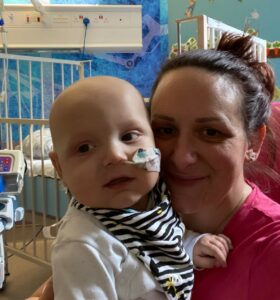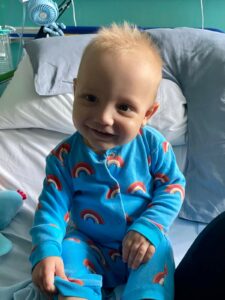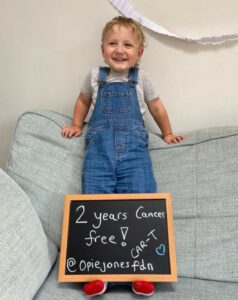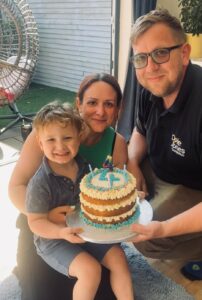
16 Jul 2024
Adjusting to a ‘strange new normal’
Opie Jones’ leukaemia treatment has created a huge legacy. His mum Lucy Ellerker-Jones and her husband Lewis have set up a foundation to help families and carers access mental health support while their children are going through cancer treatment. Lucy and Lewis paid privately for counselling, and believe it was the most important part of their own recovery from the trauma of their son’s blood cancer. While Opie is now a healthy and happy four-year-old, the treatment he had took a significant toll on the family.
Opie was born on May 19th, 2020, and was a big strong healthy baby for the first few months.
“He was the biggest of all the babies I had,” said Lucy, who shares Opie’s older sister, now eight, with Lewis, and has two teenage daughters of her own, who, together with Lewis’s daughter, make up Opie’s four sisters. “For the first few months he was a robust and happy little boy. And oddly he didn’t begin to show any symptoms until a few days before his leukaemia diagnosis. It was autumn by then and I remember going for a long walk with a friend. Opie slept the whole way and then continued to sleep for another three hours at home. My Mum remarked he wasn’t quite as chatty and animated as usual, so I decided to take him to the GP.”
The GP found Opie’s abdomen was enlarged – which Lucy now knows was his spleen becoming swollen. He immediately sent Lucy and Opie to their local hospital.
“He had a blood test when we got there, and it took them ages to get blood as by that time his was so thick with white blood cells. The results showed his white blood cell count at over 600 when they should have been 10. Lewis rushed to the hospital to be with us. I’d gone to the doctor at 3pm, by 5pm we were in hospital, and by 7pm we were being told they thought our child had blood cancer.
“Lewis threw up. I burst into tears and immediately went into denial, walking out of the room and asking why they would tell me this. I was in total shock. What was so remarkable was at that point Opie really wasn’t showing any symptoms and was still drinking his milk.
“They had to put a canula in his forehead as his veins were so bad. We’d always joked about the massive vein on his forehead, but now it saved him. It was surreal, with so much activity around us.”

Opie with Mum Lucy during treatment
Five-month-old Opie was transferred by a special paediatric ambulance to Addenbrookes Hospital in Cambridge where he was immediately admitted to intensive care. Later that night, on October 26th, 2020, Lucy and Lewis were told he had infant acute lymphoblastic leukaemia (ALL).
“Lewis wasn’t allowed in as it was Covid time, so he had to sit in the car park until 3am when he eventually went home. Everyone in the hospital was so lovely and really helped me. I stayed the night in a special house for parents next door. I think that’s when it first hit me. I woke up the next morning and Opie wasn’t there next to me, and I had a huge panic attack; I couldn’t catch my breath and felt like the room was closing in on me.”
Lucy and Lewis told Opie’s older sisters what was going on, along with her parents, and everyone started rallying to help the family left at home. Lucy meanwhile stayed with Opie who started on immediate chemotherapy, blood transfusions, fluids and steroids.
“He ballooned from the steroids in a couple of days and really didn’t look like him. We were in a unit where we had one nurse to four patients for around ten days, then we moved onto a ward. It is a surreal experience, because you just slot into a new routine. The consultant told us his leukaemia was rare, due to his age and that he had ‘KMT2A rearranged ALL’ which is a high-risk genomic subtype which less than 60% survival rates across all age groups. They said the normal protocol of chemotherapy alone wouldn’t work and he would definitely need a stem cell transplant. So the search for a donor was started.
“In the meantime, Opie became really sick from the chemo, had repeated temperature spikes, sickness and diarrhoea and was so lethargic. He had several cycles and would recover well between each of them, and I’d be able to wrap him up in his pram and get him outside in the fresh air. But it was a rollercoaster of relentless treatments, lumbar punctures and chemo every day. I met other parents there going through the same thing that helped me massively. Sometimes we’d sit in the parents’ room laughing our heads off together because of our shared unique experiences, but the bottom line is you’re going through the most awful traumatic situation that you have no control of.”
The six weeks of chemotherapy failed to reduce the leukaemia cells completely in order to put Opie in remission. So he was changed to immunotherapy treatment which he was allowed to have at home.
“He did well on that because immunotherapy only kills the leukaemia cells and doesn’t damage the healthy ones like chemotherapy. He had a bag attached to him 24 hours a day, but he started eating again and even started to roll over which he’d begun to do before he was diagnosed. We celebrated his first Christmas at home.”

Opie in hospital
On Christmas Eve the family were told a stem cell donor had been found for Opie. He was back in hospital throughout January for more chemotherapy to prepare his body and then Opie and Lucy went to a specialist unit at Leeds Children’s Hospital. On February 16th, 2021, Opie was given his stem cell transplant.
“Opie didn’t leave his room for the time we were there, and I had only an hour a day out in the fresh air. But despite being told it could take 12 weeks, we were home in five. We thought wow, this is over now. Adjusting to life back home was hard, having spent five weeks isolated in a room together.”
But tragically on Opie’s three-month checkup in May, it was discovered he’d relapsed. The family were told their only option was CAR-T therapy, which had only recently been given commercial approval through the NHS in October 2020 for children who have relapsed.
“Within a few days we were at Great Ormond Street speaking to Professor Ajay Vora about CAR-T and its benefits and risks, which at this point was our last hope. The following week Opie and I were at Great Ormand Street for four days while his cells were harvested, a process called apheresis. Opie’s cells were then sent to America to turn them into a personalised CAR-T therapy or as we called them ‘the SAS of cells’.
“It took seven weeks and during that time his leukaemia became very aggressive, he developed a lump on his face and we were back as inpatients at Addenbrookes. Opie needed higher dose of chemotherapy and immunotherapy to stop his leukaemia progressing.”

Opie two years cancer free
Opie eventually received his CAR-T cells at Great Ormond Street in July 2021.
“We knew he would have cytokine release syndrome (CRS) which is when the body has an immune response to the cells. The staff were well prepared and Opie developed CRS on day four. He had a tremor in his leg but the doctors were on it. He had two doses of the drug tocilizumab which calms the CRS and spent 11 hours in intensive care as a precaution. When he returned to the ward, he was back to his usual happy self. We were discharged home three weeks after being admitted to Great Ormond Street – just in time for my older daughter’s 21st birthday.”
From that point on Opie has continued to go from strength to strength.
“He has no B cells and as a result has to have immunoglobulin therapy to replace his immune system. But slowly life has started to return to normal – a strange new normal. It was hard because we thought once before everything was OK and then it wasn’t. It’s also frightening leaving hospital and the comfort of all the staff and care around you.”
Opie continued to have regular blood tests and lumbar punctures until in August 2023 when he successfully hit his two-year anniversary after his treatment.
“Life will never be the same again and we can’t go back to how it was. There’s a broken bit of me that will never be put back together, but I’ve found lots of ways to manage it – talking, therapy, grounding, mindfulness. Lewis and I have had counselling together and separately, which was the most helpful thing. That’s why we decided that we wanted to help other parents access that too.”
The Opie Jones Foundation became a registered charity in June 2023 and provides financial grants to families going through their childhood cancer experiences to get the mental health support they need. The charity also advocates for earlier access to advanced cell and gene therapies like CAR-T, creates awareness of childhood cancers worldwide, and provides access to up-to-date patient and parent friendly resources to support parents and family members.
Meanwhile Opie, who’s now four, continues to thrive.
“He’s amazing. He doesn’t have the memories in the way we all have which I’m thankful for. His body is covered in scars though, his immune levels aren’t as good as a normal child, and he gets tired. But he’s hitting all his milestones and growing fast. He will know one day of course; he continues to have check-ups for the rest of his life, and we will help him to understand when the time is right.”

Opie with Mum and Dad
Discover more stories from our community.
Related posts
21 September 2022
A record year for Leukaemia UK London Marathon runners
62 runners put their best feet forward for Leukaemia UK A record 62 runners are taking part in this year’s London marathon to help fund vital research into leukaemia diagnosis,…
24 August 2022
Non-existent awareness of leukaemia symptoms “extremely worrying” – say leading UK leukaemia charities, as they launch memorable new campaign to get people “parroting on” about the symptoms
People over 55 also underestimate their risk, thinking that leukaemia is a childhood disease. Only 11% of over 55s thought that they had the greatest risk of leukaemia[1], whereas in…
7 November 2024
University of Southampton’s Dr Giorgia Chiodin Wins Olive Boles Innovation Award
Dr Giorgia Chiodin from the University of Southampton has been awarded the prestigious Olive Boles Innovation Award for 2024. Awarded annually to a Leukaemia UK John Goldman Fellow, this award…
11 February 2022
International Childhood Cancer Day: Dr Samanta Mariani reflects on her research into infant leukaemia
On International Childhood Cancer Day, Dr Samanta Mariani reflects on her research into infant leukaemia, what drives her in her work and her hopes for the future.